
How to maximize your marketing budget (whatever it is)
Check out our easy-to-understand guide to help you make the most of your marketing budget (regardless of how big it is).
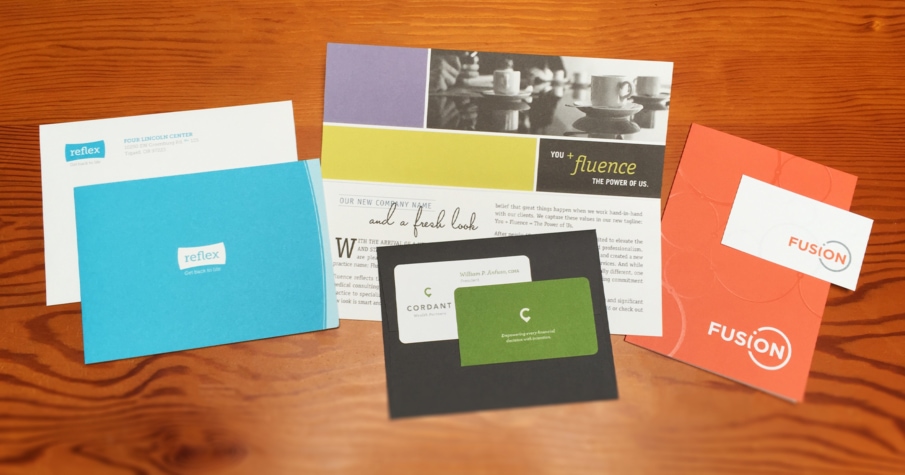
Making the decision to rename your company is a big deal.
If you’re considering investing in this process, you probably have a lot of conflicting feelings and opinions. Most likely, you have sweat and equity – not to mention history – behind your existing company name.
Having worked with many clients through a company rename, we know full well emotions can run high. Reactions to the idea will run the gamut from excitement to resistance to fear.
It’s understandable – on one hand, it is an opportunity that rarely comes about in a company’s lifecycle, and it can be thrilling to embrace the future of your business. On the other hand, let’s face it: change is scary and hard – and a new name will propel you into the big unknown.
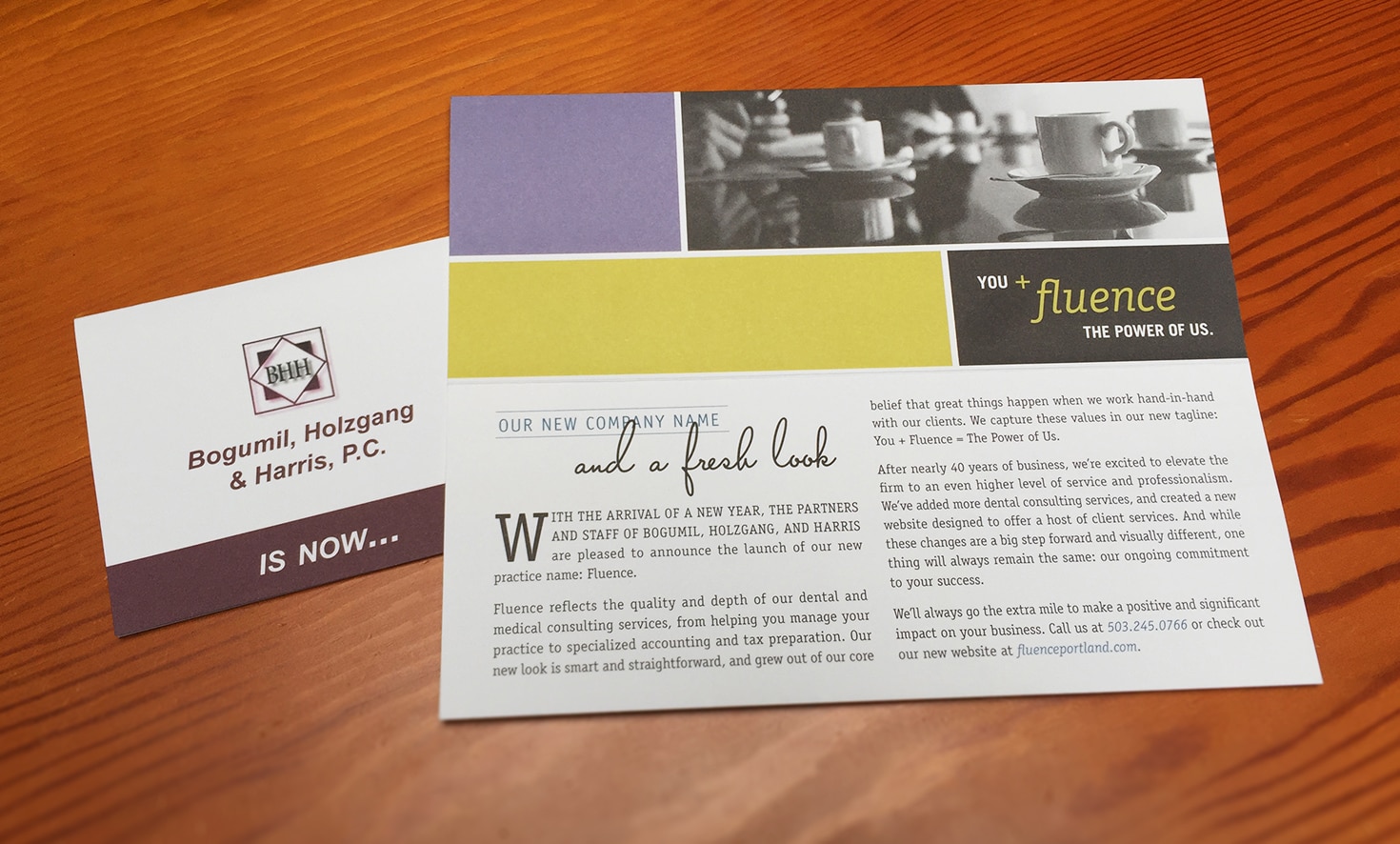
There are many reasons a company may decide to change their name, but to help you in your decision-making process, here are a few common drivers:
As time passes, companies grow and industries change – and your business may have evolved beyond its origins. For example, Sony was once Tokyo Telecommunications Engineering Company. A company that started out as Janus Payroll may have grown to offer a wide range of accounting services. Not to mention Joe Janus, the original founder, may have gotten out of the company a decade ago. If your company has outgrown its name, it’s probably time for a new one.
In certain industries like law and engineering, it’s very common to name a company after a series of partners. This can be extremely hard for clients to remember, and names can be hard to spell. If you have to instruct people how to pronounce your name, fewer people will say it (or even be able to remember it) – making it more difficult to get word-of mouth advertising.
There are real companies named Xobni, Svbtle, Kiip, Speesees, Hermes (pronounced AIR-mez), and Cius (SEE-us) but can you imagine the struggles their employees go through every day trying to spell their name to prospects, vendors, and customers?
Boring, hum-drum names like Quality Service Professionals, Accurate Accounting, 1Stop Consulting, or PBHS Architects are difficult to find on the web because they aren’t unique.
To see what I mean, go search on Google for Star Consulting. Go ahead, I’ll wait.
You probably just found a ridiculous number of companies called some variation of Star Consulting. And here's just one problem with that: Imagine I meet someone at an event where I also meet quite a few other people. Unfortunately, I forget most of their names… but luckily I remember that one was from Star Consulting, so I Google it when I get home. Oops.
This can be a problem if your name is too common and may be widely used… such as Abacus Bookkeeping (a company which exists independently in Vermont, California, Florida, Kentucky, and Utah on the first page of search results alone).
Or, if you have a company using a surname, you may also run into problems – under US trademark law, a name which is “primarily merely a surname” cannot be protected as a trademark without proof that it has “acquired distinctiveness.” Finally, you may have named your company years ago without trademarking the name, and could be approached by another company’s lawyer stating you are infringing on their copyrighted name. Yikes!
If any of these sound familiar, or if you have a name that is holding you back from the greatness you aspire to achieve, then it’s time to make a change.
While it’s tempting to start by asking people (team members, friends, your spouse, and so on) for ideas of names they like, throwing spaghetti against the wall and hoping something sticks is probably the least effective way to name a company. Often this path leads to weak names, clichés, and overused choices (like, say, Abacus Bookkeeping or Star Consulting).
Moreover, if you involve multiple people in the name generation, review, and choosing, you’ll likely fall into the quagmire of disastrous opinion sharing. This includes what people don’t like (usually every name proposed) along with people championing a favorite (which, shockingly, is generally the name they came up with). Naming by committee results in loss of focus, indecision, delays, compromised work, and dissatisfaction with the result. Groupthink unfortunately dilutes any unique result because “it sounds weird.”
When we work with our clients, we have a proven approach that results in distinct names that are reflections of a company’s brand. Here is a brief overview of our process:
The first step in any branding initiative is to get clear on the company: who they are, what they stand for, and how they’d like to present their company to the world. We start the rename process with a discussion around a company’s mission, core values, and big vision – the “why” behind the business.
Then we get crystal clear on what makes our client unique in the marketplace. We want to know: Are they the smartest? Highest quality? Most disruptive? Most reliable? What sets them apart from everyone else? Having a solid understanding of the company’s Remarkable Selling Point (RSP) is critical to selecting a name that perfectly expresses their brand.
Next, we turn our attention outward. Our team conducts an in-depth analysis of our client’s competitive landscape and their industry at large – anyone with whom they might be vying for their customers’ attention. What other names are they up against, and how are their competitors talking about themselves? What are other brands trying to evoke, and what are they saying makes them different? We begin to think about how our client’s company name can distinguish them in this space. Where everyone else is zigging, we help them zag.
Likewise, we tap their customers for insights on how they perceive our client’s company, brand, and services. We ask our client to pick several of their best customers and we conduct customer interviews, asking them what they enjoy most about working together. Why did they choose our client over alternatives? What, in their eyes, makes their business unique? This can be an eye-opening exercise into the true value a business brings to the world, and can inform the direction of the company name.
Armed with a deep understanding of our client’s company and its surroundings, it’s time to start crafting their brand story and how they would like to carry it through their name. Who would they like to be in the eyes of their customers, employees, competitors, partners, and the world?
One way Kinesis does this is through an Archetype exercise. It’s a pretty involved topic that merits its own blog post, but for now, imagine a company as a character in a book or movie. Is it the wise old Mr. Miyagi, patiently coaching its clients to “wax on, wax off?” Or is it a caped hero, swooping in at the last moment to save customers from distress? Maybe it’s the rebellious Han Solo – daring to go up against some proverbial Galactic Empire in its industry, the way Apple positioned itself against Microsoft.
We are all emotional buyers, and Fortune 100 companies have known this for a long time. People feel very different about Monster vs. Mello Yello vs. Diet Coke even though they are all Coca-cola-owned soft drinks… and that’s due, in part, to the names accurately reflecting those emotions. Telling the brand story – via an archetype, in a sales meeting, or on a website – is the perfect starting point to define the emotions evoked when people hear the company name.
Now comes the hardest part. We take all of the information we’ve gathered about our client’s business (their brand foundations, competitive landscape, and the story we are telling) and we begin to shape it into a company name.
There’s a lot to consider at this phase – including root origins, number and emphasis of syllables, length, letter sounds, spelling, pronunciation, word associations, etc. Not to mention additional external factors – such as available URLs, whether similar names already exist in the same industry or geographic location, and ensuring they have a defensible trademark (a company brings in a qualified trademark attorney for this step).
Once we complete all of the steps in the process, we roll out the name to the rest of the company. The new name has a distinct sound and feeling – we work to ensure that the internal team embraces it and understands how to talk about it before we publicly launch it. We also use the new name as a springboard for additional rebranding efforts such as a new logo, website, or marketing materials. Once these are complete, we implement a grand launch for our client’s new name and visual identity helping to garner attention to their company.
Here are several rename examples to showcase the power of this type of transformation:
Before: Bogumil, Holzgang, and Harris was an accounting firm named after several of its key partners. While customers adored their services, no one could remember their firm name. They had a brilliant reputation for outstanding service, but didn’t have the differentiation they wanted. They wanted a name that better reflected their evolving and progressive company.
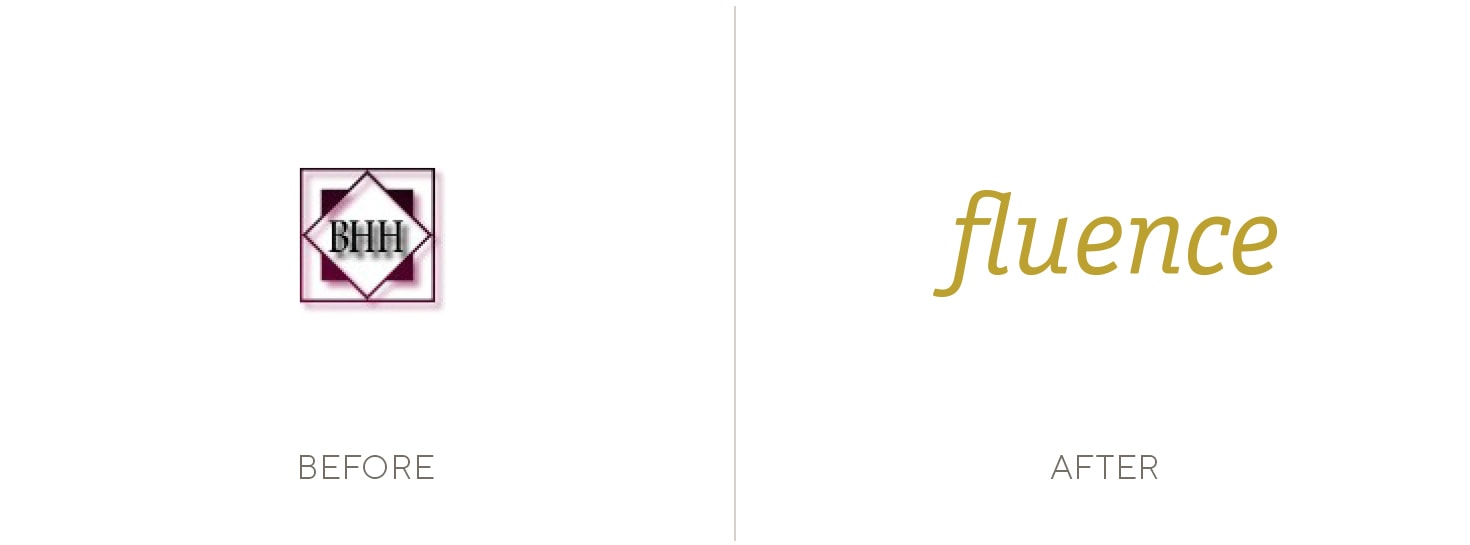
After: Fluence. The new company name was a combination of several words: 1) Fluent from the Latin root meaning flowing and proficiency in a skill; 2) Confluence: the converging of two or more streams and 3) Affluence: a flowing toward abundance. In an industry filled with conservative companies based on surnames and partner initials, Fluence stood out and helped the company get noticed. It also lent itself to their great new tagline: You + Fluence = The Power of Us.
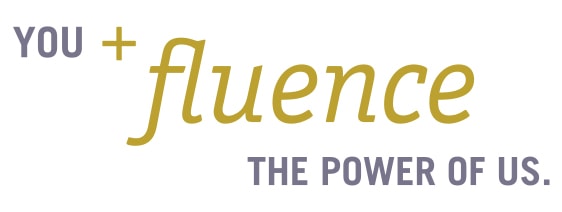
Before: Integrated Joint Specialists came to Kinesis as a start-up. Run by enterprising physicians, they were intent on providing non-surgical treatments to people with knee pain who didn’t want (or need) a knee replacement. The company is forward-thinking and integrates new technology and innovative healthcare procedures into its practice. The name Integrated Joint Specialists was pretty unremarkable and they wanted a name that married approachable and innovative.
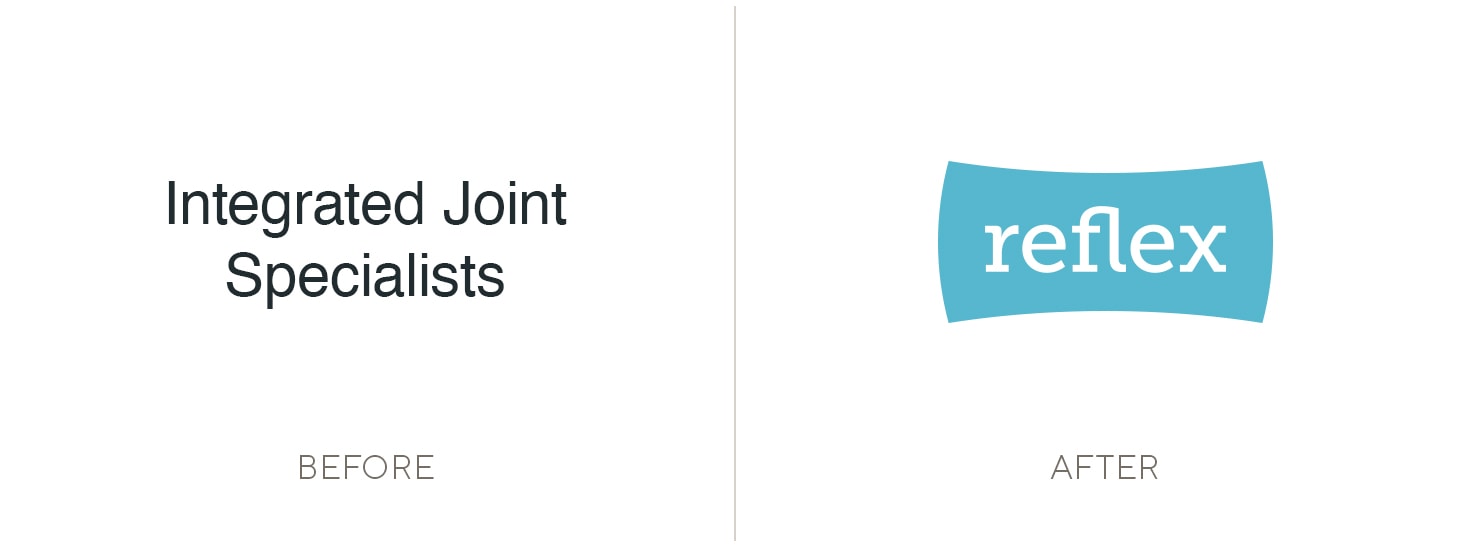
After: Reflex. The practice’s new name was short and easy to remember. It also has a great association, which is the patellar reflex. That’s the little jump everyone’s knee makes when a doctor hits the patellar tendon with a mallet. This helps focus people on the company’s sole focus, knee health. The word, reflex, has the meanings “responsive” and “quick reaction,” which help express the company’s ingenuity and cutting-edge treatment methods.
As you can see, a bold, differentiated name shows your confidence and helps you stand out in a cluttered marketplace. People will buy from a name they can remember and gets them excited. Your best prospects will get behind a name that tells a story.
But, if you currently have a name that doesn’t differentiate you, there’s no story to tell. At the end of the day, don’t keep a name that isn’t working for you. Take the big, bold step of a rename and embrace your company’s evolution.
At Kinesis, we help our clients stand out among their competitors through our comprehensive transformation process, Marketing From the Inside Out®. Learn more about the type of clients we serve.
Get insights like this straight to your inbox.